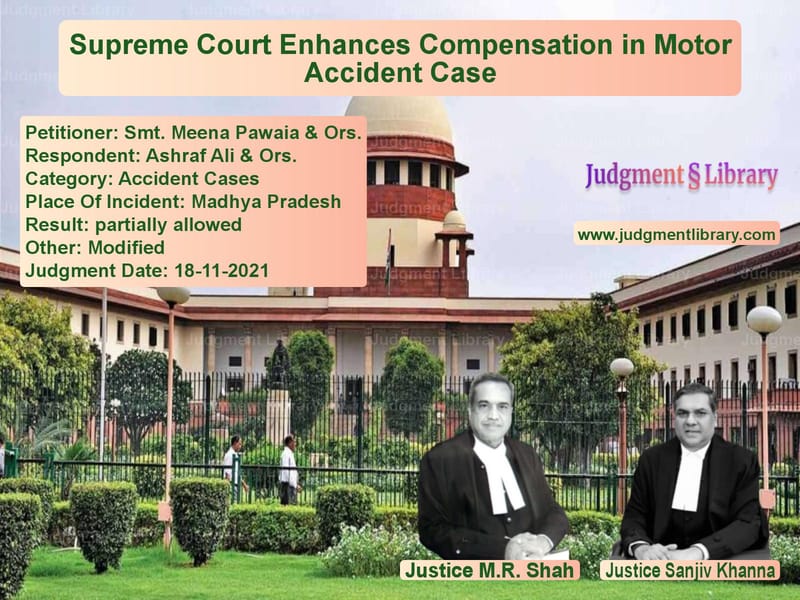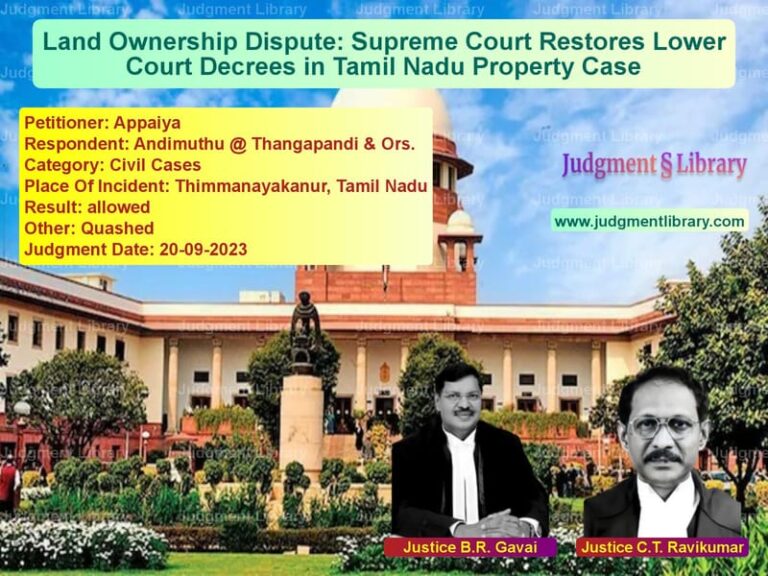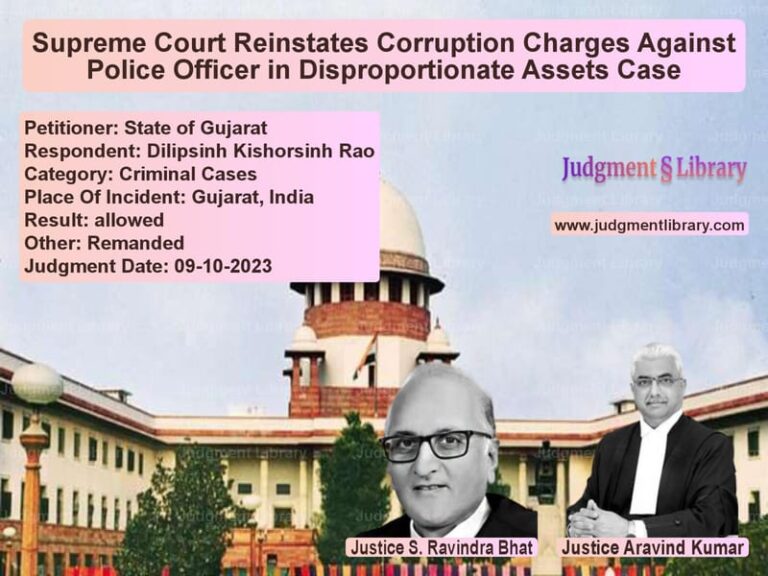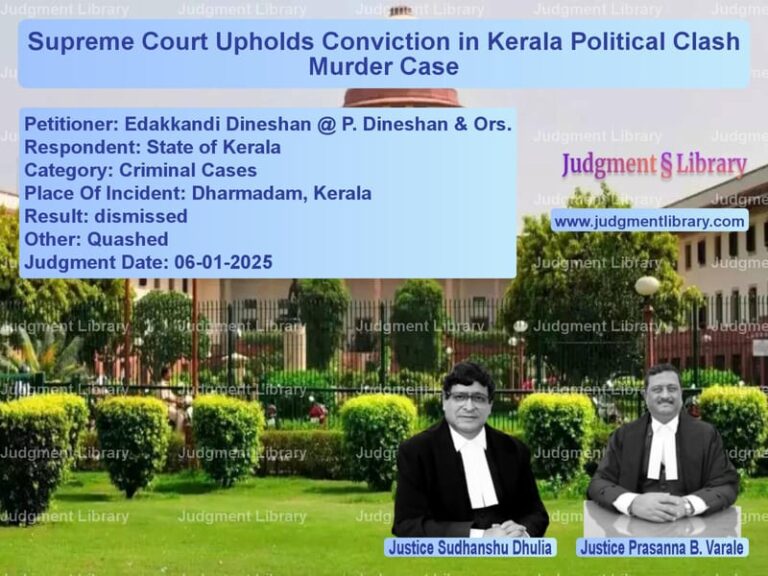Supreme Court Enhances Compensation in Motor Accident Case
The Supreme Court of India, in its judgment dated 18 November 2021, significantly increased the compensation for the family of a young engineering student who died in a road accident. The case, Smt. Meena Pawaia & Ors. vs. Ashraf Ali & Ors., revolved around determining the fair compensation for the loss of a bright young life due to the negligence of a truck driver.
Background of the Case
The accident occurred on 12 September 2012 when Prashant, a 21-year-old third-year engineering student, was fatally injured due to the negligent driving of a truck. His family, including his mother, father, brother, and sister, filed a claim before the Motor Accident Claims Tribunal (MACT), seeking compensation of Rs. 25 lakhs for their loss.
The MACT, after assessing the evidence, awarded a total compensation of Rs. 12,85,000, with an interest rate of 7.5% per annum. However, the Union of India (Railways), the owner of the truck, challenged this decision before the Madhya Pradesh High Court. The High Court, in its ruling, reduced the compensation amount to Rs. 6,10,000, a decision that was strongly contested by the deceased’s family, leading them to approach the Supreme Court.
Read also: https://judgmentlibrary.com/road-accident-conviction-in-goa-supreme-courts-judgment-on-rash-driving/
Petitioners’ Arguments
The petitioners, represented by their legal counsel, contended:
- The High Court had arbitrarily reduced the compensation without considering the deceased’s educational background and future earning potential.
- The deceased was a promising student pursuing a Bachelor of Engineering (B.E.) and had a bright career ahead.
- Even under the Minimum Wages Act, a skilled laborer in 2012 would earn at least Rs. 5,000 per month, and a qualified engineer would have earned significantly more.
- The High Court failed to apply the correct multiplier for determining future economic loss.
- The compensation should include future prospects and a reasonable estimate of the deceased’s likely earnings.
Respondents’ Arguments
The respondents, represented by the Union of India, countered the petitioners’ claims, arguing:
- The deceased was not employed at the time of the accident, and his actual earnings were uncertain.
- The claimants had already accepted the reduced compensation awarded by the High Court in execution proceedings.
- The MACT’s calculation of Rs. 15,000 as monthly income was based on speculation and was unjustified.
- The compensation should be limited to a notional income figure since the deceased had no actual earnings at the time of death.
Supreme Court’s Observations
The Supreme Court bench, comprising M.R. Shah and Sanjiv Khanna, carefully examined the calculations used by both the MACT and the High Court. The Court observed:
- The deceased was a bright student pursuing engineering, which indicated strong future earning potential.
- The High Court’s reduction of monthly income to Rs. 5,000 was too low and did not consider inflation, skill level, and future growth.
- Even under the Minimum Wages Act, unskilled laborers earned Rs. 5,000 per month in 2012, meaning an engineering graduate’s expected salary would be significantly higher.
- As per established legal principles, future prospects should be considered when determining compensation for young individuals.
Key Supreme Court Rulings Cited
The Court relied on several landmark rulings, including:
- National Insurance Co. Ltd. v. Pranay Sethi (2017) – Stating that future income prospects should be factored into compensation calculations.
- Sarla Verma v. Delhi Transport Corporation (2009) – Establishing the multiplier method for compensation based on the deceased’s age.
- Reshma Kumari v. Madan Mohan (2013) – Clarifying the need for consistency in applying multipliers.
Final Judgment
The Supreme Court modified the High Court’s ruling and significantly increased the compensation. The key directives were:
- The deceased’s monthly income was assessed at Rs. 10,000, considering his educational background and future career prospects.
- A multiplier of 18 was applied, given the deceased’s age of 21-22 years.
- Future prospects were factored in, increasing the final compensation amount.
- The final compensation awarded was Rs. 15,82,000, with an interest rate of 7% per annum from the date of the claims petition.
- The Union of India was directed to deposit the balance enhanced compensation amount within six weeks.
Implications of the Judgment
The Supreme Court’s ruling has far-reaching implications for motor accident compensation cases in India:
- Recognition of Future Earnings: The ruling reinforces that a young deceased’s potential earnings must be considered when awarding compensation.
- Fair Compensation for Families: The decision ensures that families of accident victims receive adequate financial support.
- Precedent for Future Cases: The ruling will guide lower courts in similar cases, ensuring uniformity in compensation calculations.
- Multiplier Consistency: The case reaffirms the importance of applying correct multipliers based on age rather than parents’ age.
By enhancing the compensation, the Supreme Court has reaffirmed the principle of “just compensation” under the Motor Vehicles Act, ensuring that victims’ families are not unfairly deprived of financial security.
Petitioner Name: Smt. Meena Pawaia & Ors..Respondent Name: Ashraf Ali & Ors..Judgment By: Justice M.R. Shah, Justice Sanjiv Khanna.Place Of Incident: Madhya Pradesh.Judgment Date: 18-11-2021.
Don’t miss out on the full details! Download the complete judgment in PDF format below and gain valuable insights instantly!
Download Judgment: smt.-meena-pawaia-&-vs-ashraf-ali-&-ors.-supreme-court-of-india-judgment-dated-18-11-2021.pdf
Directly Download Judgment: Directly download this Judgment
See all petitions in Compensation Disputes
See all petitions in Negligence Claims
See all petitions in Motor Vehicle Act
See all petitions in Judgment by Mukeshkumar Rasikbhai Shah
See all petitions in Judgment by Sanjiv Khanna
See all petitions in partially allowed
See all petitions in Modified
See all petitions in supreme court of India judgments November 2021
See all petitions in 2021 judgments
See all posts in Accident Cases Category
See all allowed petitions in Accident Cases Category
See all Dismissed petitions in Accident Cases Category
See all partially allowed petitions in Accident Cases Category







